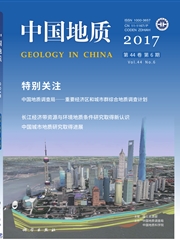

 中文摘要:
中文摘要:
克拉通破坏的时间和范围是华北克拉通破坏研究的重要基础问题,但是在华北克拉通破坏时间与破坏范围的问题上存在着不同观点。本文通过对位于华北克拉通西北部银根—额济纳旗盆地苏红图坳陷内采集的火山岩进行年代学及地球化学研究,认为苏红图火山岩年龄为105~113 Ma,为一套钾质碱性系列玄武岩,其形成机制是由于岩石圈发生减薄,软流圈地幔岩浆上涌,经分离结晶而形成的,而动力学机制主要是由于西伯利亚板块、内蒙古褶皱带和华北板块在晚侏罗世发生的碰撞拼合。此外,本文还在前人对华北克拉通破坏研究基础上,依据作者对苏红图坳陷火山岩做的一些工作,粗浅地探讨了华北克拉通破坏的时间与范围的问题,认为华北克拉通周缘均为构造薄弱带,北缘为兴—蒙造山带,南侧为大别—秦岭造山带,东侧为苏鲁带和太平洋俯冲带,河套裂陷、汾渭裂陷分别与古元古代高温变质孔兹岩带及约18.5亿年前华北克拉通东、西部块体拼合时形成的中部造山带内位置大致重合,而苏红图坳陷位于中亚造山带南缘,同时也处于两板块拼合交汇处。这些构造薄弱带处在不同时期发生的俯冲与碰撞的结合部位,它们可能是岩石圈减薄的起始位置,并且它们的俯冲与碰撞时间是华北克拉通破坏的起始时间。克拉通破坏范围主要发生在太行山以东地区,太行山以西的河套裂陷、汾渭裂陷发生了减薄,而苏红图坳陷在早白垩世也发生减薄,所以,破坏范围分布在地理上呈不连续分布特征,造成这种分布特征的主要原因是由于不同区域的破坏时间与破坏的动力学机制不同。
 英文摘要:
英文摘要:
Suhongtu Depression in Inggen-Ejin Banner basin is located on the northwestern margin of the North China Craton. The periphery of the North China Craton is a weak tectonic belt, with Hing- Mongolian orogenic zone on the northern margin, Dabie-Qinling orogenic belt on the southern margin, Tan-Lu fracture zone and Pacific subduction zone on the eastern margin. Hetao rift and Fenwei rift are roughly coincident with positions of Paleoproterozoic high- temperature metamorphic rocks and the central orogenic belts, which were formed during the breakup period of the North China Craton and western blocks approximately 1.85 billion years ago. However, Suhongtu Depression is located on the southern edge of the Central Asia Orogenic Belt, and also lies at the junction of two plates. These structural weakness belts experienced subduction in different periods, and might have served as the starting locations of lithospheric thinning, and the time of their subduction and collision was the beginning of the destruction of the North China Craton. Craton destruction regions occurred mainly to the east of the Taihang Mountains, whereas thinning happened in Fenwei rift, Hetao rift and Suhongtu Depression west of the Taihang Mountains. Therefore, damages to the Suhongtu Depression lithosphere occurred on the northwest margin of the North China Craton in the late Early Cretaceous(~ 110Ma), and hence the damaged regions in the Craton were distributed discontinuously in geography, which resulted from different destruction periods and dynamic mechanisms of the lithosphere in different regions.
 同期刊论文项目
同期刊论文项目
 同项目期刊论文
同项目期刊论文
 期刊信息
期刊信息
